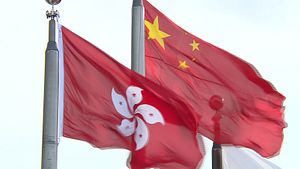Images of a Chinese military convoy lining the streets of Shenzhen, just 17 miles from Hong Kong border, might well be an ominous sign of a looming crack down on protesters in Hong Kong. While the protesters seem to have gone into another retreat after occupying the airport, the threat against them has not gone away. In reality, however, China’s options are limited.
China is no doubt losing patience with the Hong Kong events, but it cannot seriously contemplate a military occupation of the city. There are important reasons for this. In legal terms, Hong Kong law, which has been approved by China’s central government, specifically prevents China’s military presence in Hong Kong other than for defense. There is a provision under Article 14 of the Basic Law (Hong Kong’s current de facto constitution) for Hong Kong administration to “when necessary, ask the Central People’s Government for assistance from the garrison in the maintenance of public order and in disaster relief.”
For China to move troops to deal with Hong Kong protesters under this Article, Hong Kong’s Chief Executive Carrie Lam has to officially request it. So far she has not. Under pressure from the central government, she may well do so. Even then there would be no obvious guarantees that it would end the crisis, which is probably why China has not used that option.
It is not just the legal hurdles that may stop China from sending troops to deal with Hong Kong protesters. Such a move will have serious and far reaching international implications, which China may not want to face. First, the prospect of a military occupation triggering a violent and lasting internal conflict is real. This might not be a serious impediment for China in other regions, but it will be in Hong Kong, which is still perceived as an international issue even though Chinese official media reject that it is, stressing instead that it is an internal matter. It will be more costly for China to clear the mess after a military occupation of Hong Kong than to find a solution short of that.
At the same time, a military occupation will tear the image that China has been presenting in its foreign policy in the past decade: that in spite of being a superpower, it stays clear of wars (which it has), and that its engagement with the rest of the world is peacefully geared to trade and development.
This image has enabled China to promote itself as a benefactor keen to support the development aspirations of other countries via low rate loans within its Belt and Road Initiative (BRI). China’s involvement in a military conflict that inevitably has external ramifications can severely damage President Xi’s aspirations of expanding peacefully outside China’s borders through the BRI.
Another development that has raised suspicion about China’s possible occupation of Hong Kong is statements by Carrie Lam, its chief executive, that the situation is dangerously reaching a path of no return. Her language in disguise raises the fear that a crackdown by China could be imminent and the outcome might be worse than if she were given the chance by the protesters to resolve the crisis.
This may well be true, but it can also be that she is trying to find her own way out of the abyss. There were reports (denied by Lam’s office) that in July she offered to step down but China said she had to stay and end the crisis that she had created. Whatever the truth about these reports, there is no doubt that China needs her. She is China’s winning card. If she demolishes the protests, which is what China wants, she will be China’s hero. If she does not, she will be a convenient scapegoat for China to blame.
Either way, the future for Lam is not bright. For China, she has to appear hard, unbending, and resolute against the repeated demands of the protesters who want her to withdraw the extradition bill.
Protesters, on the other hand, expect her to withdraw the bill, bring to justice the police personnel engaged in brutal force against the demonstrators, release arrested activists, and for the administration to refrain from calling the demonstrations as riots.
So far, she has not been able to convince the protesters that she will listen to their demands. They see her as the side who provoked them to take action against the ill-advised (now suspended) extradition bill. She has claimed that she would right that wrong, but has stopped short of withdrawing the bill, which would have been the first step in that direction.
With Carrie Lam not earning the trust of the protesters and seemingly losing China’s blessing she now appears to have tough choices to make: to side with the protesters and defy China’s pressure or to side with China and order the police to suppress the protest movement at any cost. But it’s not much of a choice. She may side with China and there’s no guarantee she can end the protests; but for China the advantage of Lam staying in place is as a sacrificial lamb – someone to accuse for the troubles and remove from office while making temporary peace with the protesters.
Abbas Faiz lectures on human rights at Essex University’s School of Law in the UK. He was formerly Amnesty International’s Researcher on South Asia.

































